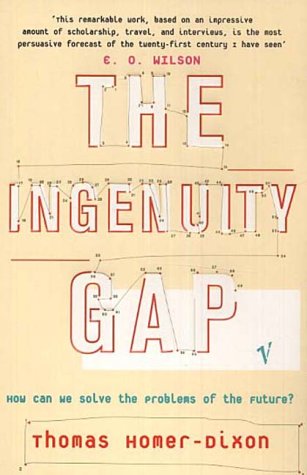Items related to The Ingenuity Gap : How Can We Solve the Problems of...

"synopsis" may belong to another edition of this title.
Homer-Dixon is very good when he tackles particular problems, and his interests are wide-ranging, moving from the psychology of an airplane cockpit during a crisis to the depletion of the world's fisheries to differences between the minds of Neanderthals and Homo sapiens. He also dredges up fine details. Did you know that "the largest human-made structure on the planet is not an Egyptian pyramid or a hydroelectric dam but the Staten Island Fresh Kills landfill near New York City, which has a depth of one hundred meters and an area of nine square kilometers"? There's plenty to argue with on these pages, and some readers will find Homer-Dixon's tendency to write in the first person a bit self-indulgent. Yet fans of big-think books like Jared Diamond's Guns, Germs, and Steel, David Landes's The Wealth and Poverty of Nations, and Robert Wright's The Moral Animal will find The Ingenuity Gap riveting. --John J. Miller
As he explores the possible consequences of this gap, Thomas Homer-Dixon offers an absorbing assessment of the state of the world and our ability to fix it. Culling from an astounding array of fields-from economics to evolution, political science to paleontology, computers to communications -he integrates his vast knowledge into an accessible and engaging argument. This is a book with profound implications for everyone that we can ill afford to ignore.
"About this title" may belong to another edition of this title.
- PublisherVintage
- Publication date2001
- ISBN 10 0099286289
- ISBN 13 9780099286288
- BindingPaperback
- Edition number1
- Rating
Buy New
Learn more about this copy
Shipping:
US$ 4.88
Within U.S.A.
Top Search Results from the AbeBooks Marketplace
THE INGENUITY GAP : HOW CAN WE S
Book Description Condition: New. New. In shrink wrap. Looks like an interesting title! 1.01. Seller Inventory # Q-0099286289

